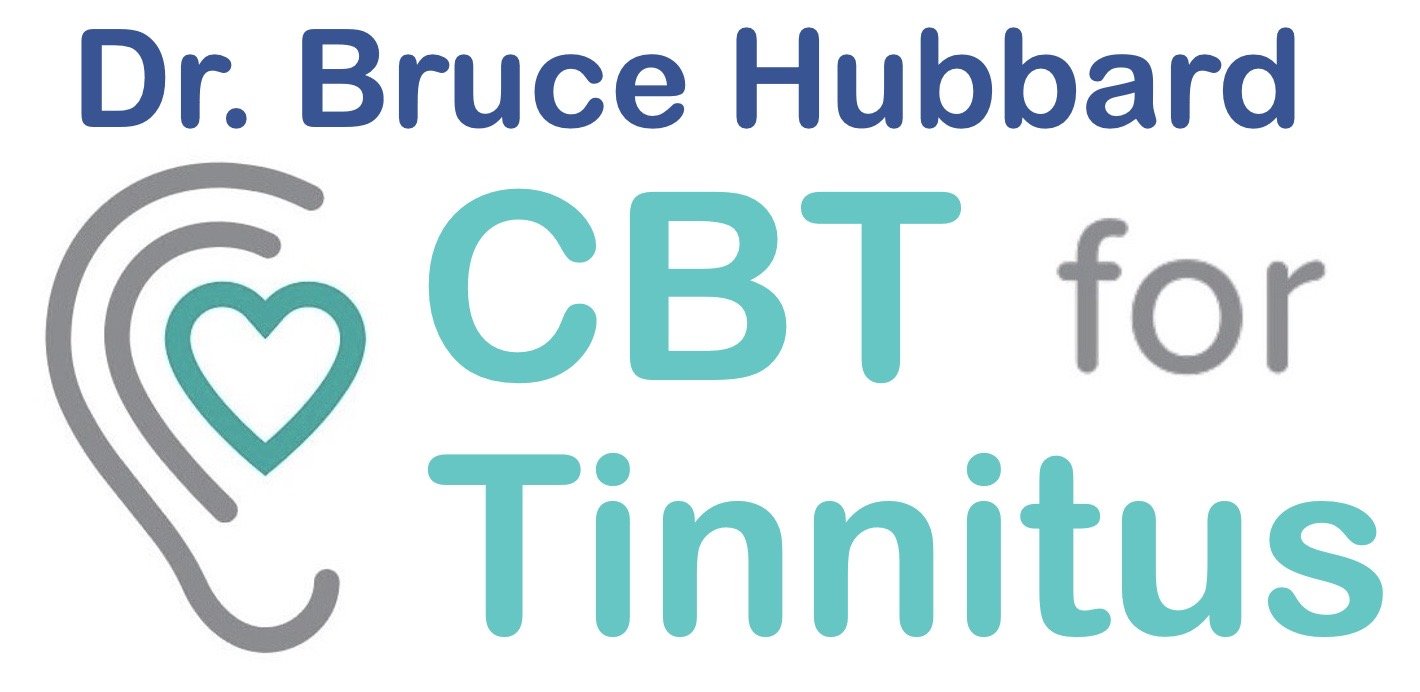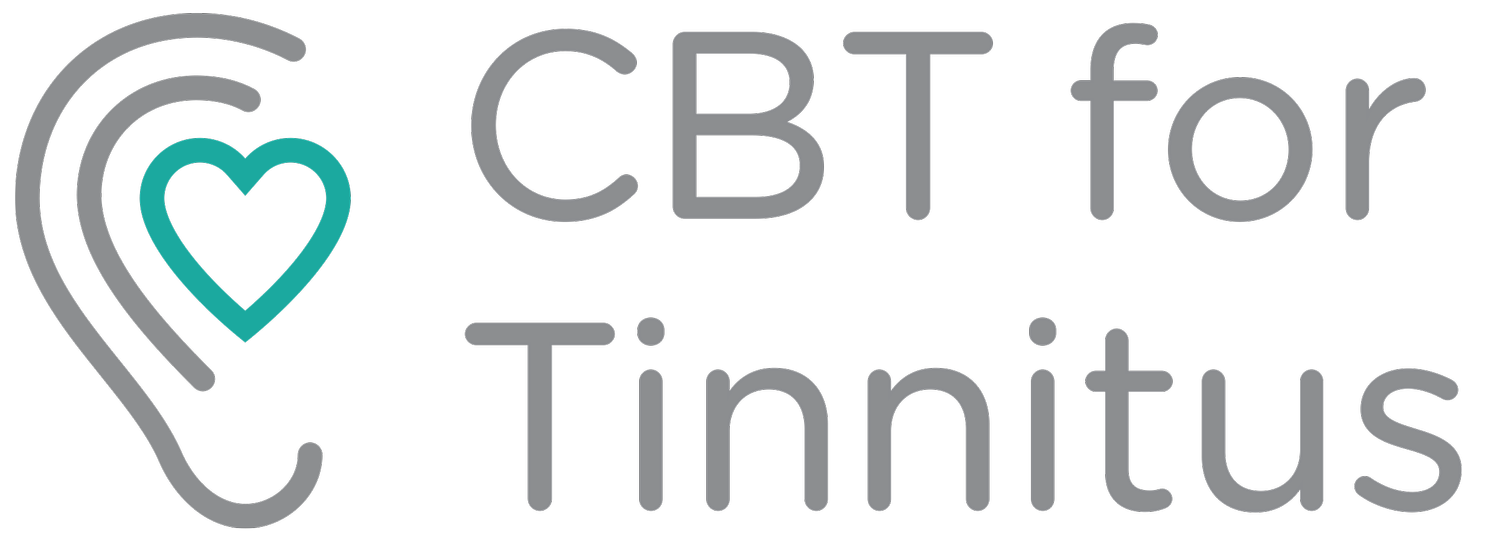DR. HUBBARD’S TINNITUS SUCCESS STORY
I am an experienced clinical psychologist who has worked with countless patients, including many with severe tinnitus. But the words above are not from one of my patients. They came from my own lips, when my life was hijacked by tinnitus. These panicked, pessimistic sentiments reflect a condition called tinnitus distress—a perfect storm of anger, annoyance, anxiety, fear, sadness, and despair, that impairs concentration, interferes with sleep, and disrupts functioning in all areas of life. Even as a behavioral health specialist, the relentless whine of tinnitus had me trapped in a synergy of hurt.
For many years, predating my tinnitus, I have specialized in a science-based form of mental health treatment called Cognitive Behavioral Therapy (CBT). CBT is a set of learned skills—healthy habits and perspectives—that work together to change your emotional response to stress and trauma. In 2005, at the height of my tinnitus distress, I used CBT to guide my own recovery.
It's tough to revisit the time in my life when I first encountered tinnitus. But it's been useful, as I can see how far I've come from those early, tortured months. I wish for others to find hope and inspiration in my story.
My Condition
As for my condition, I hear two constant, high-frequency tones and a pulsing hiss. The sounds are sufficiently loud that I can detect them against most levels of background noise. In response to certain external sounds—sharp, high frequencies, any loud noise, booming bass—my hearing distorts, and I feel the nails-on-a-chalkboard-like sensations of hyperacusis. Everything is worse on the right side, where I also experience the dull, vacancy of high-frequency hearing loss.
Hijacked!
When the condition came on suddenly in 2005, it hijacked my life. Like most of us, I found it difficult to fall sleep, and once asleep, the tones would wake me up. I took to wearing earplugs around my young children, whose high, loud voices triggered sound sensitivity. At work, in the quiet of my office, the tones were blaring, and even slightly raised voices triggered my hyperacusis. And I was haunted by catastrophic thoughts about where it would all end.
From adolescence, I’d been an avid rock musician. And I tortured myself with the belief that my prolonged indulgence in loud music had caused the condition. I faced the imposed reality of a radical new soundscape: one that was muffled, infected with alien sounds, and distorted in reaction to my own singing voice.
I was panicked, desperate to escape the sounds and sensations that inhabited my head, that were destroying my life. After months of trying various supposed remedies that didn't work, I began to truly believe my doctor’s words, that there was no cure. I became depressed, withdrew from friends and family, and abandoned my musical activities. Having developed phonophobia, I came to avoid safe settings that I irrationally believed would result in further damage to my hearing. Obsessed with the certainty that my hearing and my life would only get worse, I began to consider a foreshortened future.
Cognitive Behavioral Therapy (CBT)
For help, I turned to Cognitive Behavioral Therapy (CBT), the most researched approach for tinnitus distress and an approach I understood intimately through my work as a psychologist. I used CBT to help manage the fear, anger and despair brought on by my condition, to grieve the loss of silence, of crisp, clean hearing, and to hasten my recovery.
Cognitive Skills
First and foremost, I had to deal with my negative thinking. It’s so easy to become obsessed with horror stories about tinnitus. I recalled my meeting years earlier with a former patient, whose hearing condition affected him so severely that he could barely tolerate sitting in my office. At the time I didn't understand what he was going through. But once I caught a taste for myself, I could not get this man’s story out of my mind. I felt certain that my condition would worsen, that I would be unable to live with it, that his horror would become my future.
Worst-case-scenario thoughts like this, so common for tinnitus sufferers during the early months, greatly fueled my fear and despair. I turned to CBT's cognitive skills to help ground my thinking in a more reasonable reality. I learned the facts about tinnitus: that the condition is rarely as disabling as it had been for my patient. I learned that tinnitus is not a death sentence, because even if the sounds and sensations don't go away, there's a natural, neurological process called habituation, through which the brain can learn to screen tinnitus out. To remind myself of these facts, and encourage a hopeful attitude, I wrote out some grounded, reasonable thoughts—what I called my “recovery statement”—to review throughout the day. It went something like:
"OK, maybe my condition won't go away, but over time, I will learn to live with it, adjust to it, tune it out. And I certainly hope it doesn't get any worse, but I refuse to let my brain 'what if' me to death. I choose to live! And in the event that my condition does get worse, then I will be just as determined as I am now to accept, adjust and habituate."
Thinking this way calmed me down, and helped redirect my attention and energy to what I could do to get better.
Acceptance & Mindfulness
And that meant accepting my moment-to-moment reality, the overwhelming truth that I had no direct control over the sounds and sensations of tinnitus. I could not turn them off even for a minute, to catch my breath, to brace for the next assault. For me it was 24/7. The sweet relief of silence was gone forever. It was one thing to understand this intellectually, and quite another to accept it at the core of my being, in my heart-of-hearts. How could I live in harmony with a condition that I experienced as a monster, that I had come to fight and loathe with every fiber of my being? To nurture this deep acceptance, I used a meditative technique called "mindfulness."
Mindfulness is the primary acceptance strategy in CBT. It strengthens your ability to create mental "space" between an unwanted, distressing experience like tinnitus and your response. If you can't directly control a stimulus, then having the space to step back can provide welcome relief. Mindfulness can help soften your experience of tinnitus, making it easier to tolerate and to try out more effective ways of responding. I think of mindfulness as stepping out of a fire: you still feel the heat, but are no longer consumed by the flames.
In CBT, mindfulness is used to help with difficult, unwanted experiences, like recurrent depression, generalized anxiety, ruminative thinking, and obsessive urges. Mindfulness-based programs for tinnitus, that draw on the work of Jon Kabat-Zinn, are currently under development. But in 2005, in the throes of my distress, I stumbled on the approach quite by accident.
My practice of mindfulness predated my tinnitus. I would regularly set a timer, sit still, and calmly observe my breath. When my attention wandered, I would simply notice where it had gone and gently escort it back. Once my hearing condition set in, practicing mindfulness was excruciating, as all I focus on was the screaming in my head. The sounds were so loud, so upsetting, so distracting, that there was no way I could calmly focus on my breath.
Rather than give up, I decided to make tinnitus sounds themselves the object of mindfulness. I used the same approach I'd learned to help my patients soften their experience of depression, stress and anxiety to soften my experience of tinnitus. I practiced listening to tinnitus sounds, and feeling tinnitus sensations with open, accepting attention, allowing them to exist as part of my new soundscape. As you can imagine, the first weeks of mindfully listening to tinnitus were extremely challenging. But through patient, persistent effort, it got easier, and I believe, greatly accelerated my recovery.
Self-Guided Sound Enrichment
Background sound, used for full or partial masking, is the oldest and most commonly applied solution for tinnitus. However, rather run background sound throughout the day, as most sound therapy programs prescribe, I targeted specific situations where I was most distressed and distracted by tinnitus: while reading and working at my desk, while sleeping, and while practicing mindfulness. The sound was both soothing and helped my tinnitus blend into the background so that I could more easily redirect my attention where I wanted it to go. And as my recovery progressed, I gradually weaned myself off.
Rejoining Life through Graded Exposure
With the help of cognitive skills and mindfulness, I was ready to take on an area of CBT called desensitization, AKA, “exposure.” Exposure has been used effectively in CBT for decades to promote recovery from phobias, panic attacks, and many other emotional conditions. So, I considered desensitization a perfect tool to help me adapt and habituate to tinnitus.
Exposure provides opportunities for your brain to learn that the sounds and sensations of tinnitus are not dangerous, just meaningless stimulation that can be safely ignored. The brain has a natural tendency to screen out unimportant, meaningless sound. Just as the brain learns to screen out the ticking of a clock, the din of a passing traffic, even sounds as loud as the whistle of a passing train, your brain can learn to screen out the sounds and sensations of tinnitus. Once this occurs, your distress goes down, you are no longer preoccupied with tinnitus. Applying cognitive skills and mindfulness facilitates exposure. Through exposure, you gradually learn that, even when you are distressed, you can handle the challenge, and no longer avoid and escape situations that had been lost to tinnitus. Over time, your experience becomes easier, your confidence improves, and you can rejoin your life.
By slowly and gently reversing my avoidance and reintroducing myself to sound, I created opportunities for my brain to learn that my tinnitus was not important. I gradually reduced my use of external masking, when working at my desk, meditating, and falling sleep at night. I courageously challenged myself to participate in settings I had believed would make my tinnitus worse (like parties, movie theaters, crowded restaurants), and removed the earplugs I used for protection against the sounds that triggered hyperacusis (music, putting away dishes, my children’s’ voices).
“I’m trapped! It won’t stop! It’s on 24-7 and I can’t think about anything else. I’m desperate for relief, but convinced relief won’t come. My life is ruined. I’m certain that I can never learn to live with tinnitus!”
At first, these experiences were upsetting, and triggered my negative thinking, which threatened to make everything worse. But exposure is an opportunity to work through these difficult emotions and counter worse-case-scenario thinking with grounded, reasonable thinking, to gradually build the emotional muscle needed for recovery. And every few minutes, I would stop what I was doing, close my eyes, and practice resuming a mindful, accepting stance toward the sounds and sensations that had begun to fade into the backdrop of my new life. Eventually, I noticed that I had stopped thinking about tinnitus and was instead absorbed in what I was doing. Sweet habituation!
Living Again!
Armed with the tools of CBT—cognitive skills, mindfulness and exposure—I gradually resumed all of the activities I had abandoned. I'm fully engaged at work and at home. I fall asleep without masking, and I perform with a new band– this time, no amplifiers! It took time, patience and a healthy dose of courage, but I've made a full adjustment to life with tinnitus. I rarely notice the sounds and sensations, and when I do, it is without the debilitating emotional weight they once carried. If I don't notice my tinnitus, is it still there? When I don't notice my tinnitus, I have my silence back!



